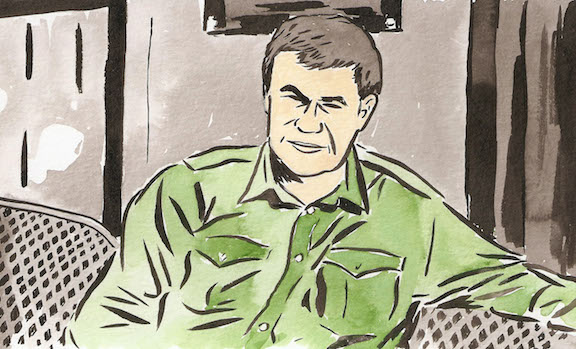What We Talk About When We Talk About Raymond Carver
By Nathan Gelgud

Raymond Carver by Nathan Gelgud, 2014.
The late Raymond Carver’s birthday is this weekend, but you might think twice before cracking open a cold one to celebrate. The great short story writer known to many as America’s Chekhov was a master of the genre, but according to Carol Sklenicka’s biography of Carver, he said that his proudest accomplishment was going sober.
Drinking and alcoholism are often linked with writers' lives, and Sklenicka’s book makes clear that the more you do one, the less likely you are to be doing the other. Though he dreamed of being a full-time writer, Carver admitted that even as he started to achieve success, he often found himself pursuing full-time drinking. Meeting John Cheever – a chronic lush and probably Carver’s only competitor for the title of greatest American writer of short stories – at the Iowa Writers’ Workshop couldn’t have helped.
Carver led a hardscrabble life, marrying and starting a family without the means or emotional maturity to do so, relocating too often to ever settle, chasing different jobs and running away from demons. His first wife, Maryann, supplied Carver with material, telling him stories about customers who came into restaurants where she worked as a waitress. According the Sklenicka, one of Carver’s breakthrough stories (“Fat”) took shape when Carver embellished one of Maryann’s anecdotes, doing little more at first than jotting it down the way she told it. Maryann also supported Carver and their kids while he tried to make it as a writer, and she deferred the ambition to further her education so Carver could take different jobs in different cities.
Carver’s life was not a happy one, and this is not a cheery book. For writers, Carver’s devotion to his craft is inspiring and his missteps are cautionary. For admirers, Sklenicka’s book isn’t out to shatter illusions exactly, but it will be hard to celebrate Carver without reservations. For readers interested in questions about artistic ownership or the death of the author, the evolution of Carver’s stories as they passed under his editor Gordon Lish’s pen are packed with heady questions about whether art belongs to the artist. It’s an expansive book with a broad reach, worthy of the writer who wrote seemingly minimal stories that were packed with emotion and impact.
